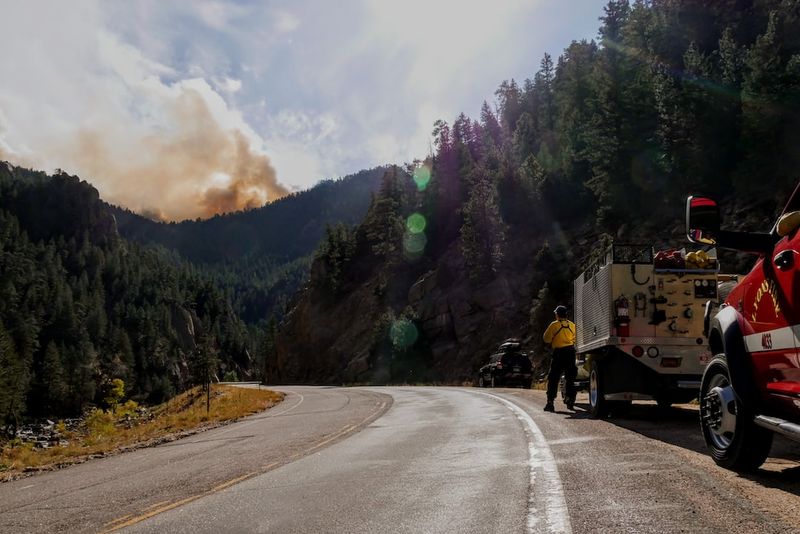Wildfires Spark State of Emergency in Yellowknife
A Growing Threat to Yellowknife
The capital city of Yellowknife in the Northwest Territories has declared a state of emergency due to the ongoing wildfires that are inching closer to the city, now less than 30 kilometers away. The decision was made during an emergency council meeting on Monday evening. While the city is not yet considered under direct threat, the smoky air and the proximity of the fires have prompted officials to take measures to ensure the safety of the community.
Precautions and Resources
In a social media post, the City of Yellowknife stated that it will assist the community in taking necessary precautions and acquiring the equipment and resources needed for their safety. This may involve utilizing vehicles or goods for emergency response, evacuating part or all of the community, or granting qualified individuals the authority to provide services or aid in emergency interventions. It is important to note that the city hasn’t issued any alerts or evacuation orders at this time, but residents have been advised to be prepared in case the situation worsens.
An Unprecedented Airlift Effort
Over the past few hours, hundreds of residents in affected areas have been airlifted from at least three communities heavily impacted by the wildfires. The fires, fueled by strong winds, pose a significant threat to these communities. Mike Westwick, the fire information officer for the Northwest Territories, highlighted the magnitude of the situation, stating, “We’ve never seen an airlift like this. Planes are taking off from Hay River, Fort Smith, and Jean Marie River. The highways are compromised. The situation is very serious.”
The Fight Against the Flames
Firefighters, supported by heavy equipment and air tankers, are battling the fires, which have been propelled by winds reaching speeds of up to 70 kilometers per hour. Additionally, a military reconnaissance team has arrived, and the Canadian Armed Forces are set to be fully mobilized by Tuesday.
Editorial: Climate Change and the Need for Preparedness
The Cost of Inaction
The wildfires threatening Yellowknife serve as a stark reminder of the increasing prevalence and severity of such natural disasters. Climate change has contributed to the intensification of wildfire seasons globally, and Canada is no exception, as evidenced by the current situation in the Northwest Territories. The cost of inaction in addressing climate change is becoming clearer each day.
A Call for Preparedness and Resilience
As the fires encroach upon Yellowknife, it is crucial that communities, local governments, and national authorities focus not only on firefighting efforts but also on proactive measures to prevent and mitigate the impact of wildfires. These efforts should include increased investments in wildfire management, the implementation of better land-use planning practices, and improved building codes to enhance wildfire resistance. Moreover, strategies to address climate change as a whole, such as transitioning to renewable energy sources and reducing greenhouse gas emissions, are imperative to curbing the frequency and severity of wildfires in the long term.
Community Support and Solidarity
In times of crisis, it is essential for communities to come together and support one another. The residents of Yellowknife and the affected communities deserve our solidarity and assistance. Individuals who are able should consider volunteering, donating to relief efforts, or advocating for policies that prioritize climate action and disaster preparedness.
Advice for Residents: Staying Safe and Prepared
Stay Informed
Residents of Yellowknife should remain vigilant and stay informed about the latest updates from local authorities and emergency management agencies. Official channels, such as the City of Yellowknife‘s social media accounts and local news outlets, will provide real-time information regarding alerts, evacuation orders, and other safety measures.
Create an Emergency Plan
Having a well-thought-out emergency plan is crucial in times of crisis. Residents should develop a plan that includes communication strategies, evacuation routes, and a designated meeting place for family members. It is also important to prepare an emergency kit with essential supplies, such as food, water, medications, and important documents.
Follow Official Guidelines
Residents should follow the guidelines and instructions provided by local authorities. If evacuation orders are issued, it is essential to follow them promptly and calmly. By adhering to official instructions and cooperating with emergency responders, individuals can help ensure their safety and the overall effectiveness of the emergency response efforts.
Support Local Firefighters and Emergency Services
The firefighters and emergency services working tirelessly to combat the wildfires deserve our support and gratitude. Residents can show their appreciation by adhering to fire safety measures, such as being cautious with fire sources and ensuring proper extinguishment. Additionally, supporting local fundraising efforts and initiatives aimed at assisting emergency responders can make a significant impact.
Conclusion
As Yellowknife faces the threat of encroaching wildfires, it is a grim reminder of the urgent need to address the underlying causes of such disasters. Climate change and its impact on the frequency and severity of wildfires cannot be ignored. It is crucial that we prioritize preparedness, resilience, and climate action to protect our communities and mitigate future risks. May the people of Yellowknife find strength in unity as they face this challenging situation.

<< photo by Malachi Brooks >>
The image is for illustrative purposes only and does not depict the actual situation.
You might want to read !
- Kendall Jenner and Bad Bunny Spark Romance Rumors at Drake’s Party
- Fort Smith’s First Responders Face Relocation: A Disruption to Emergency Services
- Relocating Fort Smith First Responders: A Vital Move for Enhanced Emergency Services
- Wildfires | Yellowknife Declares State of Emergency
- Kamloops, B.C.: Urgent Evacuation Alerts as Fire Rapidly Spreads
- Prime: US Senator Demands Investigation into KSI and Logan Paul
- Canada Braces for Impact: Biden Declares State of Emergency as US Storms Threaten Northern Border




